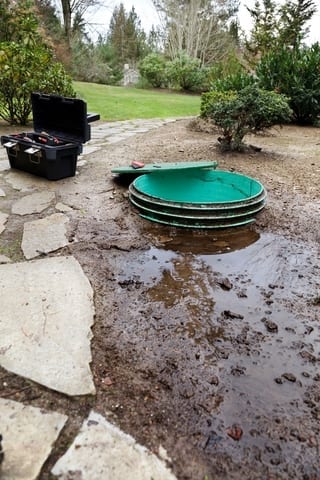What is Title V?
 When you have not sold a home in many years, you may be unfamiliar with what Title V is and how it works.
When you have not sold a home in many years, you may be unfamiliar with what Title V is and how it works.
In Massachusetts, Title V refers to a state law regulating and monitoring septic system operation, maintenance, and inspection. The purpose of Title V is to protect public health and the environment by ensuring that septic systems are properly designed, installed, and maintained.
Under Title V, property owners must inspect their septic systems before transferring property. This inspection is conducted by a certified inspector who evaluates the condition and functionality of the septic system. The inspector checks for any signs of failure, such as leaks, blockages, or inadequate drainage.
If the inspection reveals that the septic system is not functioning properly, the property owner is responsible for repairing or replacing the system to bring it into compliance with Title V requirements.
Failure to address any issues identified during the inspection can result in fines and penalties.
Title V also applies to properties that are being sold or transferred. Before the sale, the septic system must undergo an inspection and obtain a valid certificate of compliance. This certificate ensures that the septic system is in proper working order and meets the standards set by Title V.
Overall, Title V plays a crucial role in safeguarding public health and the environment by ensuring the proper functioning of septic systems. It helps to prevent contamination of groundwater, surface water, and drinking water sources, which can have serious consequences for both human health and the ecosystem.
Massachusetts Title V Requirements
When I meet with a potential client considering selling their Massachusetts home, I first explain the Title V septic system law if the property does not have a public sewer. You will also see this referenced as Title V as well.
When a septic system is servicing your home, one of the most important considerations is getting your Title 5 certification. The last thing you want is a problem with your septic system!
As a Massachusetts Realtor involved in numerous home sales, it always amazes me how some sellers are so lazy about getting their Title 5 inspection taken care of before putting their home on the market.
At the very least, the septic inspection should be done within the first few weeks after the home is posted for sale. Anyone who has ever had a failed Title 5 can tell you what an ordeal it is.
The financial burden that a failed septic system creates can be pretty substantial for most folks. The cost to put in a new Title 5 compliant septic system can range from $10,000 to $50,000 or more depending on the soil conditions, water table, and whether ledge is encountered.
Aside from the unplanned financial headache, it also involves excavating your yard to install a new system.
What Happens When The Title V Inspection Fails?
So what happens if your Massachusetts Title 5 septic system fails and you do not pass the Title V inspection?
If you are put in this unfortunate position, you will need to contact an engineer and the local board of health in the town where you are located. The link provided is an excellent reference for the Board of Health roster for Massachusetts. The engineer you use will determine if a “reserve area” on the original septic system design would allow additional leach trenches to be added.
If the engineer determines a reserve area is impossible, a new septic system design must be drawn up. The septic design will be based on the soil testing that will be done. These tests are known as “perks and deep holes.” A land survey will be done as part of the process to ensure that any work done will meet zoning requirements.
The perk test will determine how quickly the soil leaches, and the deep hole test will ascertain the water table level. Grounds with gravel are more suitable for septic systems than clay and rock.
A higher water table is also not beneficial when it involves septic systems. With a high water table, you may need to have a “raised system” where different soils need to be brought in, and unfortunately, a hill is created in your yard.
Over the years, I have lost a couple of sales because the land’s topography had changed from what the buyer initially thought they were buying.
Once the septic system design is completed and approved by the board of health, the next step is to send it out for bid to a few septic system installers. I would recommend that you obtain at least three bids. In my thirty-seven years of experience selling real estate, I have seen these estimates vary quite a bit.
You’ll Be Required to Escrow Funds For Septic Failure
 Suppose you are in the middle of a Real Estate transaction and find out your septic system has failed, and it will not be able to be repaired or replaced before the closing. In that case, the lender giving the buyer a loan will most likely require you to escrow 1.5 times the average of the estimates to fix or replace the system.
Suppose you are in the middle of a Real Estate transaction and find out your septic system has failed, and it will not be able to be repaired or replaced before the closing. In that case, the lender giving the buyer a loan will most likely require you to escrow 1.5 times the average of the estimates to fix or replace the system.
For example, if replacing the septic system is $25,000, you must escrow $37,500. It should be noted that not every mortgage lender will allow a septic escrow. The buyer may wait until the installation is complete or find another lender that allows funds to be put into an escrow account.
After reading this, you probably conclude that completing your title v septic inspection is a critical hurdle to clear, especially if you have an older system.
Properly maintaining your septic system is well worth it. The cost of pumping a septic system is peanuts compared to the cost of replacement.
If you are in the unfortunate position of needing to replace your septic system, there are a few programs to ease the burden. See the Loan and tax credit information below:
Massachusetts Septic Loan Program
If your septic system has failed the Title 5 inspection, a Massachusetts loan program can help ease the financial pain. Participating lenders offer low-interest rates to eligible homeowners through this Massachusetts Housing Program.
For more information, contact the Massachusetts Housing Finance Agency (MHFA) at 617-723-0500 or go to their Web site:
Mass Housing Website Here is the Homeowner Septic Loan Repair program PDF.
Massachusetts Septic Tax Credit
When failing a Title 5, The Commonwealth of Massachusetts provides a tax credit of up to $6,000 over four years to defray the cost of septic repairs to a primary residence.
Forms are available from the Department of Revenue (DOR) to allow homeowners to claim up to $6,000 in tax credits for septic upgrades. The credit cannot exceed $1,500 annually and may be spread over four years. The tax credit will only be issued for work done on a primary residence, not an investment property or 2nd home. Tax Form Schedule SC is the correct form for the tax credits. You can get the form at the MassDOR Web site.
You may be wondering how this all applies to cesspools. Cesspools are much harder to pass in Massachusetts. Does every single cesspool automatically fail? NO.
Only those cesspools that exhibit signs of hydraulic failure are located very close to private or public water supplies or otherwise do not protect or threaten public health, safety, or the environment and will need to be changed to septic systems. Also, cesspools must be upgraded before an increase in the design flow. For example, if a bedroom is added to the home.
If you decide not to sell your home, a Massachusetts Title 5 is good for two years from the date it is completed. It can also be extended for a 3rd year if pumped in both years.
Massachusetts Title 5 Septic Systems and Bedroom Counts
Another essential matter concerning Title V and septic systems is the proper representation of bedrooms in a home.
 According to errors and omission insurance for Massachusetts Realtors, one area that has drawn the most recent litigation is the misrepresentation of bedrooms when a septic system services the home.
According to errors and omission insurance for Massachusetts Realtors, one area that has drawn the most recent litigation is the misrepresentation of bedrooms when a septic system services the home.
Septic systems are rated according to their bedroom capacity. When someone says the septic system is “rated” for four bedrooms, the system will handle the waste generated by four bedrooms.
It has nothing to do with the number of bathrooms in a home! This makes perfect sense because a septic system gets taxed by the number of occupants, not the number of bathrooms.
Where sellers and Realtors put themselves into a potential legal bind is when rooms in a home are counted and marketed as bedrooms when they are not.
For example, you could have a home with three bedrooms on the 2nd floor and another room on the 1st floor that is marketed as a “bedroom.” By all definitions, it may meet the requirements of a bedroom, such as having a closet and a window large enough for a person to fit through.
You Can Only Market a Home’s Bedroom Count Based on Septic Capacity
However, the problem is if the home has a septic system rated for only three bedrooms, it is not a four-bedroom home and should not be marketed as such.
The misrepresentation occurs when the seller or Realtor represents this room as a bedroom through various marketing channels such as the multiple listing service (MLS) or other written material.
The buyer relies on the information provided, only to later find out through town hall, the title v or other means that the home is, in fact, not a four-bedroom home. There are differences in market value between three and four-bedroom homes regardless of the house’s overall size.
Another example would be a home with an addition, and the added room is called a bedroom, but there has been no corresponding “upgrade” to the septic system.
Whenever there is doubt about the bedroom count, a Realtor should verify the records to determine the correct information. This information can usually be found in the local Board of Health records or on the septic design. If a Title V inspection is already done on the property, it will also be in the report.
Video: How a Septic System Works
I have provided a neat little video below for those who have never thought much about how septic systems work. The video is a terrific tutorial on how a septic system functions.
Final Thoughts on Title V in Massachusetts
When you are selling a house in Massachusetts, Title V is mandatory. You will not be able to procure financing on a home without passing Title V.
Sellers should complete their Title V before listing their homes for sale. By completing the Title V inspection, a significant hurdle will be cleared.
Other Title 5 Septic System Resources Worth Reading:
- The ultimate guide to septic tank pumping – see what to know about pumping a septic tank.
- All about septic systems and Massachusetts Title 5 – look at the Massachusetts Title V septic system law.
- Typical questions asked about the Massachusetts Title 5 laws – see more information on what you need to know about Title V at the Massachusetts Trial Court Law Libraries.
- General provisions 310 CMR 15.00 and enforcement of the title v laws in Massachusetts – learn how the Title V bylaw is enforced via Mass.Gov.
- A list of approved soil evaluators and Title 5 inspectors in Massachusetts – see a list of all the provided Title V septic inspection companies approved by the state at Mass.Gov.
Use these additional Massachusetts Title 5 septic system references to educate yourself on the laws better when selling a home.
The above Real Estate information on Massachusetts Title 5 septic system law was provided by Bill Gassett, a Nationally recognized leader in his field. Bill can be reached via email at billgassett@remaxexec.com or by phone at 508-625-0191. Bill has helped people move in and out of Metrowest towns for the last 37+ Years.
Are you thinking of selling your home? I am passionate about Real Estate and love sharing my marketing expertise!
I service Real Estate Sales in the following Metrowest MA towns: Ashland, Bellingham, Douglas, Framingham, Franklin, Grafton, Holliston, Hopkinton, Hopedale, Medway, Mendon, Milford, Millbury, Millville, Northborough, Northbridge, Shrewsbury, Southborough, Sutton, Wayland, Westborough, Whitinsville, Worcester, Upton, and Uxbridge MA.

